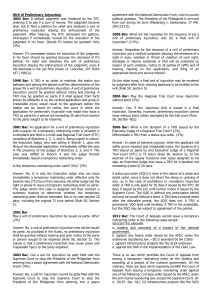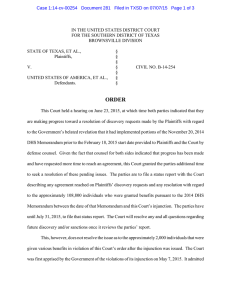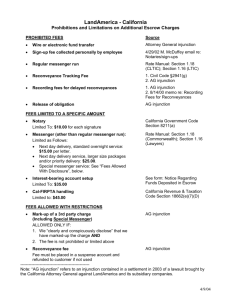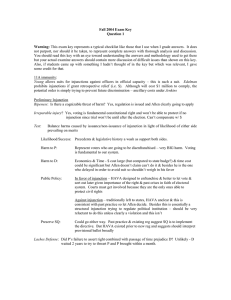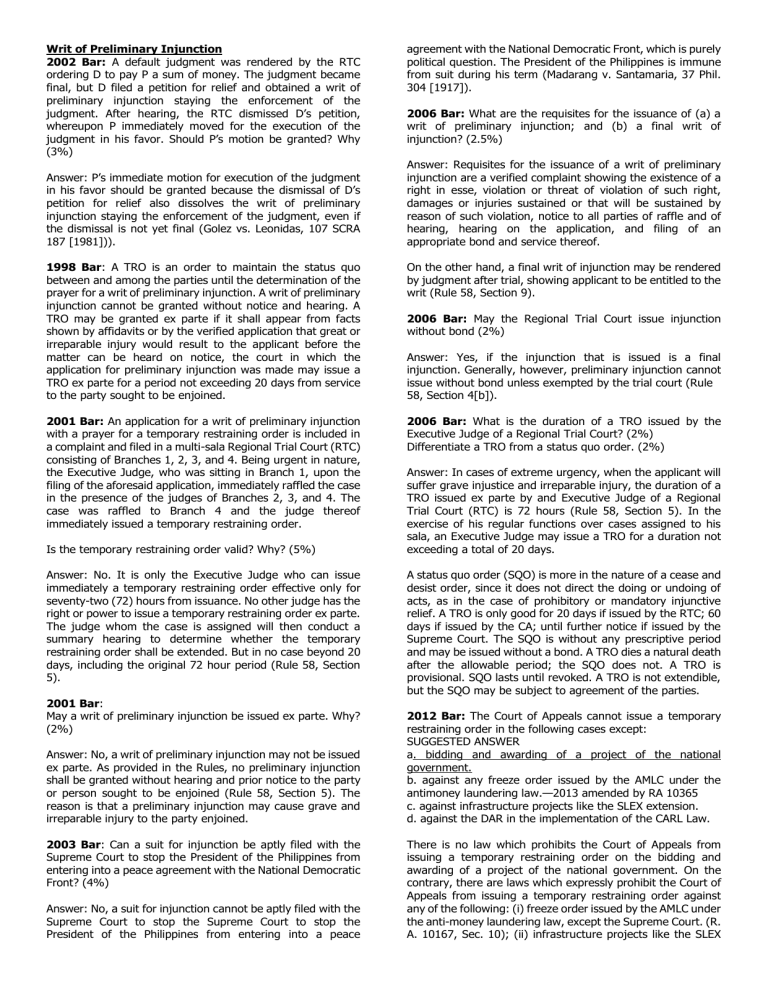
Writ of Preliminary Injunction 2002 Bar: A default judgment was rendered by the RTC ordering D to pay P a sum of money. The judgment became final, but D filed a petition for relief and obtained a writ of preliminary injunction staying the enforcement of the judgment. After hearing, the RTC dismissed D’s petition, whereupon P immediately moved for the execution of the judgment in his favor. Should P’s motion be granted? Why (3%) Answer: P’s immediate motion for execution of the judgment in his favor should be granted because the dismissal of D’s petition for relief also dissolves the writ of preliminary injunction staying the enforcement of the judgment, even if the dismissal is not yet final (Golez vs. Leonidas, 107 SCRA 187 [1981])). agreement with the National Democratic Front, which is purely political question. The President of the Philippines is immune from suit during his term (Madarang v. Santamaria, 37 Phil. 304 [1917]). 2006 Bar: What are the requisites for the issuance of (a) a writ of preliminary injunction; and (b) a final writ of injunction? (2.5%) Answer: Requisites for the issuance of a writ of preliminary injunction are a verified complaint showing the existence of a right in esse, violation or threat of violation of such right, damages or injuries sustained or that will be sustained by reason of such violation, notice to all parties of raffle and of hearing, hearing on the application, and filing of an appropriate bond and service thereof. 1998 Bar: A TRO is an order to maintain the status quo between and among the parties until the determination of the prayer for a writ of preliminary injunction. A writ of preliminary injunction cannot be granted without notice and hearing. A TRO may be granted ex parte if it shall appear from facts shown by affidavits or by the verified application that great or irreparable injury would result to the applicant before the matter can be heard on notice, the court in which the application for preliminary injunction was made may issue a TRO ex parte for a period not exceeding 20 days from service to the party sought to be enjoined. On the other hand, a final writ of injunction may be rendered by judgment after trial, showing applicant to be entitled to the writ (Rule 58, Section 9). 2001 Bar: An application for a writ of preliminary injunction with a prayer for a temporary restraining order is included in a complaint and filed in a multi-sala Regional Trial Court (RTC) consisting of Branches 1, 2, 3, and 4. Being urgent in nature, the Executive Judge, who was sitting in Branch 1, upon the filing of the aforesaid application, immediately raffled the case in the presence of the judges of Branches 2, 3, and 4. The case was raffled to Branch 4 and the judge thereof immediately issued a temporary restraining order. 2006 Bar: What is the duration of a TRO issued by the Executive Judge of a Regional Trial Court? (2%) Differentiate a TRO from a status quo order. (2%) Is the temporary restraining order valid? Why? (5%) Answer: No. It is only the Executive Judge who can issue immediately a temporary restraining order effective only for seventy-two (72) hours from issuance. No other judge has the right or power to issue a temporary restraining order ex parte. The judge whom the case is assigned will then conduct a summary hearing to determine whether the temporary restraining order shall be extended. But in no case beyond 20 days, including the original 72 hour period (Rule 58, Section 5). 2001 Bar: May a writ of preliminary injunction be issued ex parte. Why? (2%) Answer: No, a writ of preliminary injunction may not be issued ex parte. As provided in the Rules, no preliminary injunction shall be granted without hearing and prior notice to the party or person sought to be enjoined (Rule 58, Section 5). The reason is that a preliminary injunction may cause grave and irreparable injury to the party enjoined. 2003 Bar: Can a suit for injunction be aptly filed with the Supreme Court to stop the President of the Philippines from entering into a peace agreement with the National Democratic Front? (4%) Answer: No, a suit for injunction cannot be aptly filed with the Supreme Court to stop the Supreme Court to stop the President of the Philippines from entering into a peace 2006 Bar: May the Regional Trial Court issue injunction without bond (2%) Answer: Yes, if the injunction that is issued is a final injunction. Generally, however, preliminary injunction cannot issue without bond unless exempted by the trial court (Rule 58, Section 4[b]). Answer: In cases of extreme urgency, when the applicant will suffer grave injustice and irreparable injury, the duration of a TRO issued ex parte by and Executive Judge of a Regional Trial Court (RTC) is 72 hours (Rule 58, Section 5). In the exercise of his regular functions over cases assigned to his sala, an Executive Judge may issue a TRO for a duration not exceeding a total of 20 days. A status quo order (SQO) is more in the nature of a cease and desist order, since it does not direct the doing or undoing of acts, as in the case of prohibitory or mandatory injunctive relief. A TRO is only good for 20 days if issued by the RTC; 60 days if issued by the CA; until further notice if issued by the Supreme Court. The SQO is without any prescriptive period and may be issued without a bond. A TRO dies a natural death after the allowable period; the SQO does not. A TRO is provisional. SQO lasts until revoked. A TRO is not extendible, but the SQO may be subject to agreement of the parties. 2012 Bar: The Court of Appeals cannot issue a temporary restraining order in the following cases except: SUGGESTED ANSWER a. bidding and awarding of a project of the national government. b. against any freeze order issued by the AMLC under the antimoney laundering law.—2013 amended by RA 10365 c. against infrastructure projects like the SLEX extension. d. against the DAR in the implementation of the CARL Law. There is no law which prohibits the Court of Appeals from issuing a temporary restraining order on the bidding and awarding of a project of the national government. On the contrary, there are laws which expressly prohibit the Court of Appeals from issuing a temporary restraining order against any of the following: (i) freeze order issued by the AMLC under the anti-money laundering law, except the Supreme Court. (R. A. 10167, Sec. 10); (ii) infrastructure projects like the SLEX extension because only the Supreme Court can issue the same. (Sec. 10, R. A. No. 10167 and R. A. No. 8975); and (iii) DAR in the implementation of the CARL Law. (Sec. 55, R. A. No. 6657) 2012: Preliminary prohibitive injunction will not lie: SUGGESTED ANSWER a. to enjoin repeated trespass on land. b. in petitions for certiorari and mandamus. c. to restrain implementation of national government infrastructure project. d. to restrain voting of disputed shares of stock. 2007 Bar: A temporary restraining order (TRO) was issued on September 20, 2017 by the RTC against defendant Jeff enjoining him from entering the land of Regan, the plaintiff. On October 9, 2017, upon application of Regan, the trial court, allegedly in the interest of justice, extended the TRO for another 20 days based on the same ground for which the TRO was issued. On October 15, 2017, Jeff entered the land subject of the TRO. May Jeff be liable for contempt of court? Why? SUGGESTED ANSWER: No, Jeff may not be held liable for contempt. Under Rule 58, Section 5 of the Rules of Court, a Temporary Restraining Order is valid for 20 days. Its effectivity is not extendible without need of any judicial declaration to that effect, and no court shall have authority to extend or renew the same on the same ground for which it was issued, thus, Jeff cannot be held liable for contempt. No.I.C. A suit for injunction is an action in rem. SUGGESTED ANSWER: FALSE. A suit for injunction is an action in personam. In the early case of Auyong Hian vs. Court of Tax Appeals [59 SCRA 110 [1974]), it was held that a restraining order like an injunction, operates upon a person. It is granted in the exercise of equity of jurisdiction and has no in rem effect to invalidate an act done in contempt of an order of the court except where by statutory authorization, the decree is so framed as to act in rem on property. (Air Materiel Wing Savings and Loan Association, Inc. vs. manay, 535 SCRA 356 [2007]). Bar Q: May a justice of a Division of the Court of Appeals issue a TRO? 2% SUGGESTED ANSWER: Yes, a Justice of a Division of the Court of Appeals may issue a TRO, as authorized under Rule 58 and by Section 5, Rule IV of the IRCA which additionally requires that the action shall be submitted on the next working day to the absent members of the division for their ratification, modification or recall (Heirs of the late Justice Jose B.L. Reyes v. Court of Appeals, 338 SCRA 282 [2000]). 2011 BAR: The RTC of Malolos, Branch 1, issued a writ of execution against Rene for P20 million. The sheriff levied on a school building that appeared to be owned by Rene. Marie, however, filed a third party claim with the sheriff, despite which, the latter scheduled the execution sale. Marie then filed a separate action before the RTC of Malolos, Branch 2, which issued a writ of preliminary injunction enjoining the sheriff from taking possession and proceeding with the sale of the levied property. Did Branch 2 correctly act in issuing the injunction? SUGGESTED ANSWER (A) Yes, since the rules allow the filing of the independent suit to check the sheriff’s wrongful act in levying on a third party’s property. (B) Yes, since Branch 2, like Branch 1, is part of the RTC of Malolos. (C) No, because the proper remedy is to seek relief from the same court which rendered the judgment. (D) No, since it constitutes interference with the judgment of a co-equal court with concurrent jurisdiction. Receivership 2001 Bar: Joaquin filed a complaint against Jose for the foreclosure of a mortgage of a furniture factory with a large number of machinery and equipment. During the pendency of the foreclosure suit, Joaquin learned from reliable sources that Jose was quietly and gradually disposing of some of his machinery and equipment to a businessman friend who was also engaged in furniture manufacturing such that from confirmed reports Joaquin gathered, the machinery and equipment left with Jose were no longer sufficient to answer for the latter’s mortgage indebtedness. In the meantime, judgment was rendered by the court in favor of Joaquin but the same is not yet final. Knowing what Jose has been doing, if you were Joaquin’s lawyer, what action would you take to preserve whatever remaining machinery and equipment are left with Jose? Why? (5%) Answer: To preserve whatever remaining machinery and equipment are left with Jose, Joaquin’s lawyer should file a verified application for the appointment by the court of one or more receivers. The Rules provide that receivership is proper in an action by the mortgagee for the foreclosure of a mortgage when it appears that the property is in danger of being wasted or dissipated or materially injured and that its value is probably insufficient to discharge the mortgage debt BAR: Which of the following is in accord with the applicable rules on receivership? (A) The court may appoint the plaintiff as receiver of the property in litigation over the defendant’s objection. (B) A receiver may be appointed after judgment if the judgment obligor refuses to apply his property to satisfy the judgment. (C) The trial court cannot appoint a receiver when the case is on appeal. (D) The filing of bond on appointment of a receiver is mainly optional. BAR: Which of the following is NOT within the power of a judicial receiver to perform? (2011 BAR EXAMS) SUGGESTED ANSWER (A) Bring an action in his name. (B) Compromise a claim. (C) Divide the residual money in his hands among the persons legally entitled to the same. (D) Invest the funds in his hands without court approval. Q: Paula filed a complaint against Jolly for the foreclosure of a mortgage of a furniture factory with a large number of machinery and equipment. During the pendency of the foreclosure suit, Paula learned from reliable sources that Jolly was quietly and gradually disposing of some of his machinery and equipment to a businessman friend who was also engaged in furniture manufacturing such that from confirmed reports Paula gathered, the machinery and equipment left with Jolly were no longer sufficient to answer for the latter's mortgage indebtedness. In the meantime, judgment was rendered by the court in favor of Paula but the same is not yet final. Knowing what Jolly has been doing, if you were Paula's lawyer, what action would you take to preserve whatever remaining machinery and equipment are left with Jolly? Why? (2001 Bar) A: Paula’s lawyer should file a verified application for the appointment by the court of one or more receivers. Receivership is proper in an action by the mortgagee for the foreclosure of a mortgage when it appears that the property is in danger of being wasted or dissipated or materially injured and that its value is probably insufficient to discharge the mortgage debt. RULE 60. REPLEVIN 2011 BAR: Which of the following conforms to the applicable rule on replevin? SUGGESTED ANSWER (A) The applicant must file a bond executed to the adverse party in an amount equal to the value of the property as determined by the court. (B) The property has been wrongfully detained by the adverse party. (C) The applicant has a contingent claim over the property object of the writ. (D) The plaintiff may apply for the writ at any time before judgment. 2011 BAR: Which of the following has NO PLACE in an application for a replevin order? A statement SUGGESTED ANSWER (A) that the property is wrongfully detained by the adverse party. (B) that the property has not been distrained for a tax assessment or placed under custodia legis. (C) of the assessed value of the property. (D) that the applicant owns or has a right to the possession of the property. 2011 BAR: When is the defendant entitled to the return of the property taken under a writ of replevin? SUGGESTED ANSWER (A) When the plaintiff’s bond is found insufficient or defective and is not replaced. (B) When the defendant posts a redelivery bond equal to the value of the property seized. (C) When the plaintiff takes the property and disposes of it without the sheriff’s approval. (D) When a third party claims the property taken yet the applicant does not file a bond in favor of the sheriff. Q: William alleges that he owns a Range Rover. The vehicle was entrusted to Frankie, a second-hand seller, for resale to buyers. Frankie failed to remit the proceeds of the sale and also failed to return the vehicle. The vehicle reached the hands of Alvin and was registered in his name. William then filed a case for recovery of possession with writ of replevin against Alvin. Alvin then filed a Motion to Quash the writ for failure of William to establish his ownership over the vehicle. Should the writ be issued? A: NO. In a complaint for replevin, the claimant must convincingly show that he is either the owner or clearly entitled to the possession of the object sought to be recovered. By entrusting the vehicle to Frankie, William constituted the former his agent, who by acting in the latter’s behalf, was able to sell the vehicle. Since Frankie was able to sell the subject vehicle, William thus ceased to be the owner thereof. Nor is William entitled to the possession of the vehicle; together with his ownership, William lost his right of possession over the vehicle. Considering that he was no longer the owner or rightful possessor of the subject vehicle at the time he filed the case, he may not seek a return of the same through replevin (Siy v. Tomlin, G.R. No. 205998, April 24, 2017, Del Castillo, J.). Q: For failure to pay four successive installments from May 15, 2002 to August 15, 2002, respondent, through counsel, sent to petitioners a demand letter dated August 29, 2002. The demand letter was left unheeded so respondent filed on October 4, 2002 an action for replevin and damages before the MTC. However, the vehicle was never recovered and delivered to respondent despite issuance of writ of replevin. The petitioners allege that they were deprived of use and enjoyment of the mortgaged car despite the non-recovery and non-delivery of car to respondents and that the trial court erred in granting the alternative prayer for sum of money which amounted to double recovery. Are the petitioners’ arguments tenable? A: Since there was no seizure that transpired, respondents were not deprived of use and enjoyment of the mortgaged vehicle, the trial court rightfully granted the alternative prayer for sum of money which is equivalent to the remedy of exacting fulfillment of the obligation. Certainly, there was no double recovery or unjust enrichment to speak of (Spouses Agner v. BPI Family Savings Bank, Inc., G.R. No. 182963, June 3, 2013).
